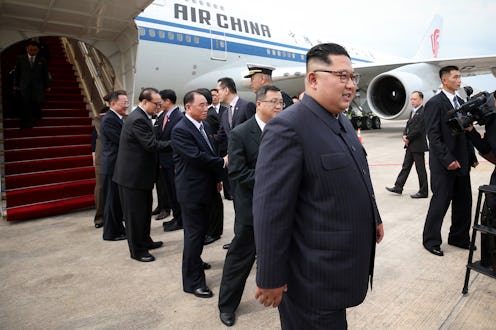News
The Likelihood Of Kim Jong Un Coming To America Is As Up In The Air As This Summit

Now this would be historic. On June 7, President Trump said he would invite North Korean leader Kim Jong Un to the United States if Tuesday's summit in Singapore goes well. "I think it would be well received, I think he would look at it very favorably, so I think that could happen," Trump said at a press conference with Japanese prime minster, Shinzo Abe.
When asked whether the potential second meeting might be held at the president's Florida resort, Mar-a-Lago, he replied, "Maybe we’ll start with the White House. What do you think?"
Kim is a source of widespread speculation, as there is relatively little information known about either him or his country. The youngest of former Supreme Leader Kim Jong Il's three sons, he assumed office in 2011 and quickly disproved assumptions that he would merely play the role of figurehead. In fact, his record suggests a ruthless, vindictive persona, committed to the preservation of North Korea's nuclear capabilities, but with a few mildly progressive policy beliefs.
In 2013, Kim reportedly had his uncle Jang Song Thaek, who also served as a political adviser, executed for plotting to overthrow him (among other things, Jang was also charged with clapping "half-heartedly"). Kim is also credited with North Korea's modest economic growth over the last few years by encouraging some private enterprise to expand.
Kim's personal views on America are somewhat shrouded, though North Korean propaganda paints a picture of America as a brutal imperialist power attempting world domination. Kim is known to be friends with former NBA player Dennis Rodman, who has proved an unlikely messenger between Kim and the rest of the world.
"When he’s around his people, he’s just like anybody else. He jokes and loves playing basketball, table tennis, pool," Rodman said in an interview with DuJour. "He says, 'I don’t want to bomb anyone. But we keep our nuclear weapons because we’re such a small country—that’s the only way we can defend ourselves.' They just want people in America and the government to know they don’t hate Americans. They want to work with Americans."
Since Trump took office, the dynamic between the two leaders has swung from childish name-calling to polite camaraderie, with significant uncertainty as to the future of the two countries' relationship in between. During the summer of 2017, Trump began calling out Kim directly for a slew of North Korean missile tests, tweeting, "Does this guy have anything better to do with his life?" A few months later he dubbed Kim "Rocket Man," and said, infamously, "They will be met with fire and fury like the world has never seen."
In the fall, the United States placed additional sanctions against North Korea, and shortly after, Kim shot back, calling Trump a "mentally deranged dotard." The fiery back-and-forth continued, until the spring of 2018, when the notion of peace talks first came up between North and South Korea. In March, North Korea suggested a "willingness to denuclearize," and on March 8, Trump confirmed that both sides had agreed to a meeting.
Although it has been confirmed for Singapore, choosing a location for the meeting was a hot question for months. From the beginning, it seemed as though Washington, D.C. was off the table, as Kim would likely be cautious of making a trip to America's capital. The New York Times also speculated that a Washington meeting could create an awkward situation for the White House, referencing the 2000 meeting of Bill Clinton and North Korean military official Jo Myong Rok. Jo wore a full military uniform with medals and a brimmed hat, creating a sense of North Korean military propaganda in photographs of the meeting.
Tuesday's meeting is also a subject of uncertainty, as the United States' goal of denuclearization is in direct conflict with the value Kim has placed on his country's nuclear arsenal — in many ways, the only real leverage North Korea has. Some believe Kim's recent conciliatory attitude is hiding the fact that he actually has no intention of giving up nuclear capabilities. Meanwhile, Trump has said he doesn't need to prepare for the summit, as attitude is a more important factor, a view that has been met with significant criticism.
Kim has never been to the United States, and a visit to America seems a long way off. Although it appears to be on the table at Tuesday's summit, given Trump and Kim's somewhat rocky past, it is uncertain as to whether it will ever happen.